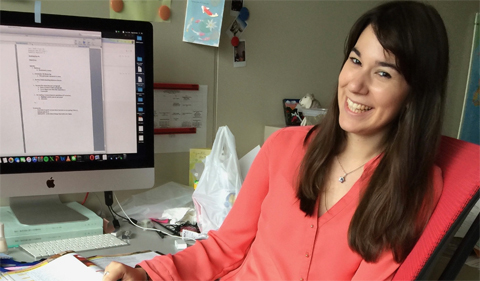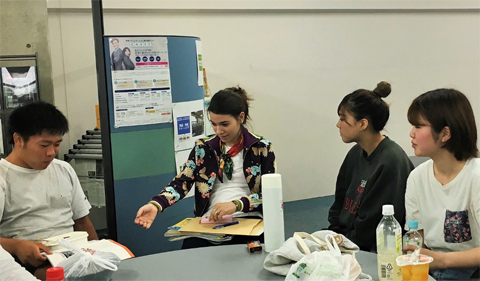Editor’s Note: The Happy Beginnings series features recent College of Arts & Sciences graduates who are getting started in careers, graduate school and service.
Ohio University alumna Olga Sormaz BA ’15, MA ’18 is always seeking out new challenges. She spent a year in a British school during her middle school years, she did study away programs in Scotland, England and France, where she also spent a year teaching English. Now she is an English instructor at the Ohio Program of English Language Teaching at Chubu University in Japan.
“Oh man! It’s a whirlwind and it’s a roller coaster of emotions,” she says of her latest adventure.
Sormaz earned two bachelor’s degrees—one in Linguistics and one in French—as well as an M.A. in Linguistics from the College of Arts & Sciences at Ohio University.
The Ohio Program of English Language Teaching at Chubu is the result of a collaborative effort with Ohio University. Since 1990, many OPELT instructors have been affiliated with the Ohio Program of Intensive English program and graduated from the M.A. in Applied Linguistics at OHIO. Instructors at Chubu teach nine 90-minute credit-bearing classes per week, which consists of six to seven classes in the Preparation for Academic Study of English Overseas, and two to three general English classes in the English Language and Culture Department.
Sormaz teaches academic courses in speaking, listening reading and writing and content courses such as English for Travel, Cultural Identity, and Pronunciation Workshop.
“These courses are much more fun,” she explains, ”because the students realize just what they can do with the language.” With just 15-minutes breaks between classes, Sormaz has found the Chubu teaching load much more intensive than anything she had previously experienced as a Linguistics TA at OHIO, where she earned the Dean’s Outstanding TA award.
At OHIO, Sormaz was working for the Athens Bread Company selling and baking bread and also doing some social media work when she interviewed for the OPELT position. She got the job, and within four weeks, she had to rush, pack and move to Japan in time for the April first start of the academic year.
She says a big difference between American and Japanese universities is the motivation of the students. Japanese students work extremely hard to get into a university, but once they are there, they feel little need to study hard. Instead they give most of their energies to the many club activities the university provides. Another difference from American universities is there tends to be more cheating. “Some students see it as a sign of resourcefulness,” she explains. “I try to show them that it is a disservice to them. I try to help them realize that they are only cheating on themselves and help guide them to make better choices. I try to help them realize the importance of their work and just how smart they really are.”
In her new teaching situation, Sormaz has had little time so far to continue her research, although the university expects its teachers to do research. She had co-authored a book chapter with the former chair of Linguistics Dr. Scott Jarvis and other linguistics graduates in The Routledge Handbook of Second Language Research in Classroom Learning.
“I am trying to go to as many conferences as possible,” Sormaz says. “I want to continue doing my pronunciation research and publish.” She sees her job as eventually helping her to get into a doctoral program. “Having had experience teaching university students really helps,” she says. “Being here in this academic situation is really helping me become a better doctoral candidate.”
Beyond her work life, Sormaz loves how peaceful it is on the streets.
“You feel really safe. And I like how people are good friends once you make the first move. I like the service in restaurants. A lot of thought goes into serving food. Every time I go to MacDonald’s they know me and are so nice to me,” she says.
Sormaz says linguistics graduates interested in teaching in Japan need to “be flexible and versatile. Being able to adapt to students’ needs and reach out to students is really important. And you need to be open minded because the university culture is very different to the United States. And not knowing Japanese is hard,” she says. “I wish I had spent one semester learning Japanese. It says Japanese is not required, but you need it to do important stuff like open a bank account. I think it’s a really good position for people to figure out who they are. While it is an isolating experience—you are by yourself for the most part—it has given me a lot of time to focus on my weaknesses and improve them and figure out my strengths. And don’t worry about moving to a new country. You will always find friends.”
She even found a French speaker from Morocco, whose mom is Japanese. “Part of the fun of the OPELT position,” she insists, “is the challenge.”





















Comments